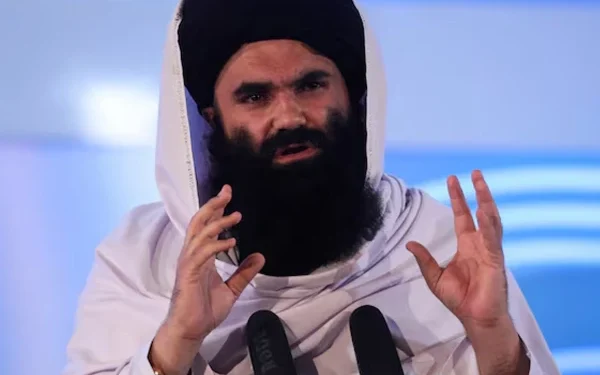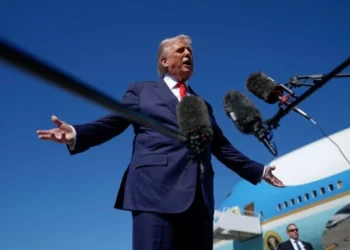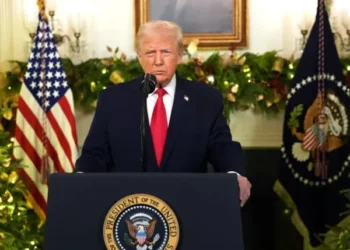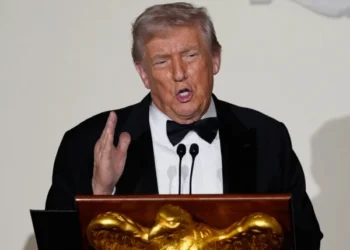Kabul: US Allegedly Ends Huge Reward for Taliban Leader Sirajuddin Haqqani
The Taliban government of Afghanistan has made a significant claim, stating that the United States has ended the $10 million reward previously placed on Sirajuddin Haqqani, a central leader of the Taliban and the country’s acting Minister of Interior. This announcement has sparked discussions about the evolving dynamics between the US and the Taliban, raising questions about the broader geopolitical implications.
Taliban’s Claim Regarding US Policy Shift
According to a report by the foreign news agency Reuters, a spokesperson for Afghanistan’s Ministry of Interior confirmed that the US has officially withdrawn the bounty that was once placed on Haqqani. However, as of now, the US State Department has not publicly confirmed this development.
Despite the Taliban’s assertions, a check of the Federal Bureau of Investigation (FBI) website still lists Sirajuddin Haqqani among the most-wanted individuals, and the $10 million reward appears to remain in place. This conflicting information has fueled speculation about whether this is a misunderstanding, a premature announcement by the Taliban, or an actual but unpublicized policy shift by the US.
Who is Sirajuddin Haqqani?
Sirajuddin Haqqani is a prominent figure within the Taliban leadership and the head of the Haqqani Network, a militant group known for orchestrating several high-profile attacks in Afghanistan. The Haqqani Network has been designated as a terrorist organization by the US government, and Haqqani himself has been accused of masterminding numerous deadly assaults on US and coalition forces, as well as Afghan civilians.
The FBI’s website describes Haqqani as a key planner behind some of the most devastating attacks against Western forces in Afghanistan, particularly those carried out along the Afghan-Pakistan border. The US had placed a $10 million bounty on him as part of the Rewards for Justice Program, offering financial incentives for credible information leading to his capture.
US Silence Fuels Speculation
One of the most intriguing aspects of this situation is the silence of the US State Department. While the Taliban insists that the bounty has been lifted, there has been no official confirmation or denial from Washington. Analysts suggest that if the reward was indeed revoked, it could signal a shift in US policy towards the Taliban, potentially as part of ongoing diplomatic engagements or undisclosed negotiations.
However, the fact that Haqqani’s name and bounty still appear on the FBI’s most-wanted list suggests that either the Taliban’s announcement is inaccurate or that the removal process is still underway but not yet publicly acknowledged by US authorities.
Haqqani’s Alleged Resignation from Afghan Interior Ministry
In a related development, reports have circulated in recent months that Sirajuddin Haqqani may have resigned from his position as Afghanistan’s Minister of Interior. These reports suggest that he may be stepping back from an active role in the Taliban government, although there has been no official confirmation from the Taliban leadership.
His alleged resignation comes amid internal power struggles within the Taliban, as various factions vie for influence and control in post-war Afghanistan. If true, this could indicate a significant shift in the Taliban’s internal dynamics and leadership structure.
Implications for US-Taliban Relations
The reported removal of the bounty, if confirmed, would represent a major development in US-Taliban relations. Since the withdrawal of US forces from Afghanistan in August 2021, diplomatic engagements between the two sides have continued, albeit in a limited and often tense capacity. The US has been negotiating with the Taliban on various fronts, including counterterrorism efforts, humanitarian aid, and regional stability.
If the US has indeed removed the bounty, it could be interpreted as a goodwill gesture aimed at fostering diplomatic channels with the Taliban government. However, it could also raise concerns about the US softening its stance on figures previously designated as threats to national security.
Regional and Global Reactions
The claim by the Taliban has drawn varied reactions from different stakeholders. Regional analysts and political observers are closely watching whether this move will impact broader counterterrorism efforts and Afghanistan’s relations with neighboring countries such as Pakistan, China, and Russia.
Pakistan, in particular, has historically had complex relations with both the Taliban and the Haqqani Network. Islamabad’s strategic interests in Afghanistan mean that any shift in US policy toward Haqqani could have ripple effects on Pakistan’s security and foreign policy strategies.
Meanwhile, human rights organizations and counterterrorism experts have expressed concerns over any potential normalization of figures associated with militant networks. They argue that removing bounties on known militant leaders without clear justifications could undermine global counterterrorism efforts and set a dangerous precedent.
Conclusion: A Developing Story with Major Implications
While the Taliban’s claim about the removal of Sirajuddin Haqqani’s bounty is significant, the lack of confirmation from the US government leaves the issue open to speculation. If proven true, this decision could mark a turning point in US-Taliban relations and reshape Afghanistan’s geopolitical landscape.
For now, the world awaits an official statement from Washington regarding the status of Haqqani’s bounty. Until then, the situation remains fluid, with potential ramifications for regional security, diplomatic engagements, and counterterrorism efforts worldwide. The coming weeks may provide more clarity on this complex and highly sensitive matter.

























